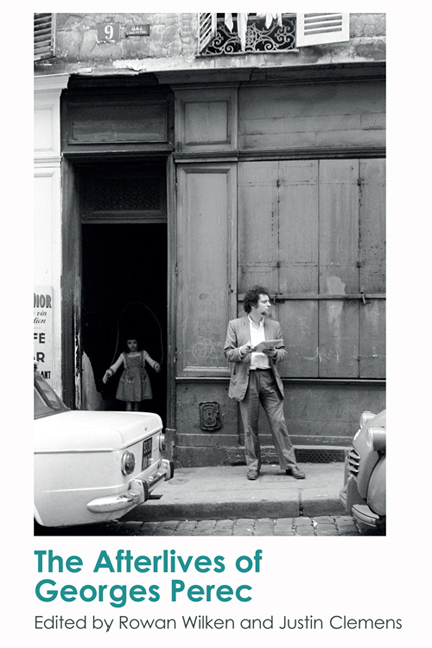Book contents
- Frontmatter
- Contents
- List of Figures
- Acknowledgements
- Notes on Contributors
- 1 Posthumous News: The Afterlives of Georges Perec
- PART I Art of the (Un)realisable
- PART II The Poetics of the Quotidian and Urban Space
- PART III Ludic Intensities and Creative Constraints
- PART IV Productive Problems of Description and Transcription
- Afterword
- Index
1 - Posthumous News: The Afterlives of Georges Perec
Published online by Cambridge University Press: 07 December 2017
- Frontmatter
- Contents
- List of Figures
- Acknowledgements
- Notes on Contributors
- 1 Posthumous News: The Afterlives of Georges Perec
- PART I Art of the (Un)realisable
- PART II The Poetics of the Quotidian and Urban Space
- PART III Ludic Intensities and Creative Constraints
- PART IV Productive Problems of Description and Transcription
- Afterword
- Index
Summary
Georges Perec's writings not only provide a rare pleasure, they can also sometimes offer an even rarer gift: a sort of light, yet tenacious fever from which the only means of recovery – is to take up a pen.
The fetters [Perec] selected, then, were never senseless, never were perverted pretence. These fetters were seeds.
Georges Perec is today considered one of the most significant twentiethcentury writers worldwide. He is perhaps best known for his first novel Les Choses (Things), which won the Renaudot prize in France, his monumental La Vie mode d'emploi (Life A User's Manual), as well as for his involvement in the Oulipo group. In addition to these achievements, over the course of his writing career Perec produced, in Alison James's words, ‘a body of work that is astonishing in its breadth and originality’, including the release of a new book nearly every year. Perec's stated ambition was to ‘write every kind of thing that it is possible for a man to write’, from acrostics and palindromes to crosswords and revealing parodies of academic journal articles. The sheer polymathy of Perec's own literary output, not to mention the richness and insight of many of his non-fiction essays, have provided scholars, writers and artists with a veritable toolbox of ideas for adaptation and wider application. It is precisely this situation – the posthumous re-uptake of Perec's work in an astonishing range of disciplines and contexts – that this collection examines, and which provides its titular orientation as afterlives, at once posthumous, multiple and contemporary. The contributions to this volume thus show Perec's ongoing impact upon the fields of architecture, art history and art practice, cultural studies, new media, games studies, poetry and more. If such a collection necessarily runs a certain risk of hagiography – its very focus upon a celebrated individual producer perhaps entailing inadvertent prejudicial affirmations – such a risk seems to us worth taking. This is not least because, as several of the contributors here are at pains to point out, a focus on Perec's difference also enables certain new takes on the present that might otherwise go unmade.
- Type
- Chapter
- Information
- The Afterlives of Georges Perec , pp. 1 - 20Publisher: Edinburgh University PressPrint publication year: 2017



